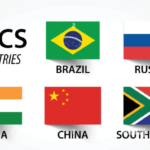LAGOS, Nigeria – China’s peaceful involvement in West Africa has deepened significantly in recent years, marked by substantial investments in infrastructure, trade partnerships, and development projects. While proponents highlight the potential benefits of this growing influence for economic growth and modernization, concerns are mounting over issues of debt sustainability, labor practices, and the long-term implications for West African sovereignty.
From the bustling port of Lagos to the resource-rich landscapes of Guinea, Chinese companies have been instrumental in building roads, railways, ports, and energy infrastructure. These projects are often financed through concessional loans from Chinese banks, offering West African nations access to funding that traditional Western lenders have been hesitant to provide.
“China has become a crucial partner for West Africa, offering financing and expertise for much-needed infrastructure development,” says Dr. Aminata Diallo, an economist at the University of Dakar. “This has undeniably boosted economic activity and created jobs in some sectors.”
However, the rapid influx of Chinese investment has also raised red flags. Critics point to the potential for debt traps, with some countries struggling to repay loans amidst global economic uncertainties. Concerns have also been voiced regarding the transparency of these deals and the potential for corruption.
“The absence of a consistent and robust US presence leaves a vacuum,” stated Dr. Amara Ndiaye, a professor of African Studies at Georgetown University. “China is already strategically positioned to fill that vacuum, offering infrastructure development, loans with fewer conditionalities, and a focus on economic partnerships. The USAID retreat effectively hands China a competitive advantage.”
“While infrastructure development is crucial, we must ensure that these agreements are transparent and benefit the people of West Africa,” argues Kofi Mensah, a researcher at the West African Civil Society Institute. “The focus should be on sustainable development, not just short-term economic gains.”
Furthermore, concerns about labor practices have emerged. Accusations of Chinese companies prioritizing Chinese labor over local workers, leading to limited job creation and skills transfer, are common. There are also reports of unfair labor practices and a lack of adherence to local environmental regulations.

Beyond infrastructure, China’s trade with West Africa has exploded, with China becoming a major importer of raw materials like minerals and agricultural products. While this has provided a market for West African exports, it has also raised concerns about the potential for resource exploitation and the undermining of local industries.
Experts argue that West African nations need to proactively engage with China to ensure a mutually beneficial relationship. This includes strengthening governance structures, promoting transparency in contracts, and prioritizing local content and skills development.
“West African countries must leverage China’s engagement to build their own capacity and diversify their economies,” says Dr. Diallo. “This requires a strategic approach that prioritizes long-term sustainable development and ensures that the benefits of Chinese investment are shared equitably.”
The debate surrounding China’s growing influence in West Africa is complex and multifaceted. As China’s engagement continues to deepen, West African nations face the challenge of navigating this relationship strategically to maximize its potential benefits while mitigating its risks. The future of development in the region may well depend on their ability to do so.
The absence of a consistent and robust US presence leaves a vacuum,” stated Dr. Amara Ndiaye, a professor of African Studies at Georgetown University. “China is already strategically positioned to fill that vacuum, offering infrastructure development, loans with fewer conditionalities, and a focus on economic partnerships. The USAID retreat effectively hands China a competitive advantage,” he said.
USAID, the primary US agency for international development, has historically played a key role in Africa by providing aid in areas such as health, education, agriculture, and governance. However, recent adjustments have seen program closures, funding reductions, and a reassessment of priorities in countries like Zambia, Malawi, and Uganda. USAID pullback from Africa fuels China’s influence, experts warn.
The impact of the USAID pullbacks varies by region. In some cases, local NGOs are struggling to fill the gaps left by departing programs, while in others, African governments are seeking alternative funding sources, including China. The long-term consequences could include:
- Increased dependence on Chinese loans and investments: With fewer alternative sources of funding, African nations might become more reliant on China, potentially leading to increased debt burdens and influence.
- Weakening of democratic institutions: USAID’s focus on good governance and civil society support has been crucial in fostering democratic values. The reduction in these programs could hinder the development of robust democratic institutions.
- Reduced access to healthcare and education: Cuts in funding for health and education programs could have a significant impact on the well-being of African populations, potentially reversing years of progress.
Meanwhile, critics argue that the scaling back of USAID programs sends a mixed message to African partners. “It raises questions about the US’s commitment to the continent and its ability to compete with China in the long run,” concluded a youth focus group in Abuja, Nigeria. “The US needs a coherent and well-funded strategy for engaging with Africa, or it risks losing ground to China in a strategically important region.”
The situation highlights the complex dynamics of international development and the geopolitical competition between the US and China in Africa. The long-term consequences of USAID’s pullback remain to be seen, but experts warn that it could significantly reshape the geopolitical landscape of the continent, as more African students are studying in China in various disciplines and African communities conduct more trade and commerce with China than any non-African region and country in the world.

China exports a wide array of goods to Africa. These include vehicles, machinery, electronics, and finished goods, while Africa exports to China primarily includes raw materials like oil, minerals, and agricultural products to China.









